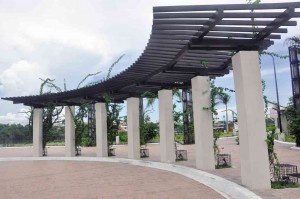Drilon: Political will worked in Iloilo cleanup

THE BANKS of the Iloilo River are now starkly different from what they were prior to rehabilitation efforts put together by Iloilo officials, led by Sen. Franklin Drilon. GUIJO DUENAS/INQUIRER VISAYAS
Sen. Franklin Drilon challenged the country’s national and local leaders to have the same political will as the officials of Iloilo had in cleaning the province’s river to revive the Pasig River and clear the country’s other polluted waterways.
Drilon made the remark in the middle of the government’s renewed effort to relocate illegal settlers living in estuaries and on the heels of international recognition for the rehabilitation of the Iloilo River.
“We still have a lot of work to do, but the good thing is we’re gaining ground and people, including international environment observers, are seeing what we are capable of doing for our rivers,” Drilon said in a statement.
“For a once-dead river to be named a finalist in an international environmental award sends a clear message. The redevelopment of rivers in the country is bound to be a success with strong political will and cooperation among the people,” added Drilon, a native of Iloilo.
The International River Foundation (IRF) recently included the Iloilo River as among the finalists for the Thiess International Riverprize award. The other finalists are the Bolshaya River in Russia, Mara River in Kenya and the Murray Darling Basin in Australia.
The award, sponsored by the Austrian government through the IRF, is a prestigious environmental award.
“I am seeing the cooperation from all stakeholders and this is crucial in the realization of our goals for the Iloilo River,” Drilon said.
Drilon, one of the leaders in the Iloilo River’s cleanup and rehabilitation, called on all sectors to keep working together to relocate families living along riverbanks and waterways.
Drilon said clearing rivers is not only a flood control measure, but also a step toward making the country’s rivers clean again and become anchors of economic development.
Malacañang has announced plans to relocate an initial 4,000 families living along estuaries in Metro Manila, offering each family P18,000 to relocate.
“The removal of all obstructions and impediments along rivers will restore the natural water flow and make the rivers sources of economic growth,” Drilon said.
Citing what was done in Iloilo River, Drilon said cooperation between the government and private individuals made possible the relocation of about 1,000 families living in danger zones along the river and its tributaries.
“If we were able to do it in Iloilo, the government, with all its resources, is definitely more capable in cleaning our rivers and waterways,” Drilon said.